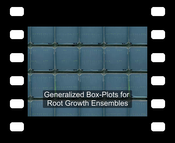Information
- Publication Type: Journal Paper with Conference Talk
- Workgroup(s)/Project(s):
- Date: 2016
- Journal: BMC Bioinformatics
- Lecturer: Viktor Vad
Abstract
Background In the field of root biology there has been a remarkable progress in root phenotyping, which is the efficient acquisition and quantitative description of root morphology. What is currently missing are means to efficiently explore, exchange and present the massive amount of acquired, and often time dependent root phenotypes. Results In this work, we present visual summaries of root ensembles by aggregating root images with identical genetic characteristics. We use the generalized box plot concept with a new formulation of data depth. In addition to spatial distributions, we created a visual representation to encode temporal distributions associated with the development of root individuals. Conclusions The new formulation of data depth allows for much faster implementation close to interactive frame rates. This allows us to present the statistics from bootstrapping that characterize the root sample set quality. As a positive side effect of the new data-depth formulation we are able to define the geometric median for the curve ensemble, which was well received by the domain experts.Additional Files and Images
Weblinks
BibTeX
@article{vad-2016-bre,
title = "Generalized box-plot for root growth ensembles",
author = "Viktor Vad and Douglas Cedrim and Wolfgang Busch and Peter
Filzmoser and Ivan Viola",
year = "2016",
abstract = "Background In the field of root biology there has been a
remarkable progress in root phenotyping, which is the
efficient acquisition and quantitative description of root
morphology. What is currently missing are means to
efficiently explore, exchange and present the massive amount
of acquired, and often time dependent root phenotypes.
Results In this work, we present visual summaries of root
ensembles by aggregating root images with identical genetic
characteristics. We use the generalized box plot concept
with a new formulation of data depth. In addition to spatial
distributions, we created a visual representation to encode
temporal distributions associated with the development of
root individuals. Conclusions The new formulation of data
depth allows for much faster implementation close to
interactive frame rates. This allows us to present the
statistics from bootstrapping that characterize the root
sample set quality. As a positive side effect of the new
data-depth formulation we are able to define the geometric
median for the curve ensemble, which was well received by
the domain experts.",
journal = "BMC Bioinformatics",
URL = "https://www.cg.tuwien.ac.at/research/publications/2016/vad-2016-bre/",
}


